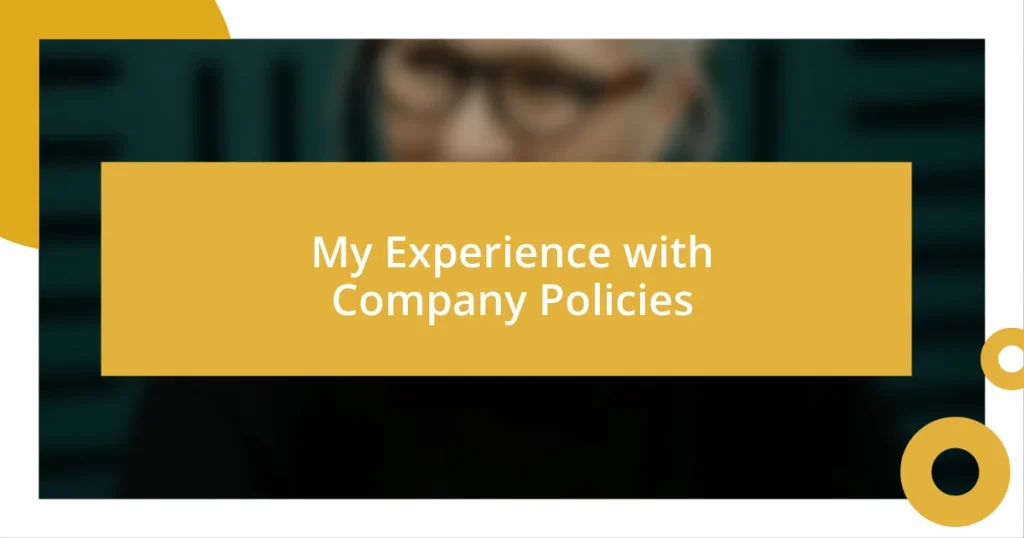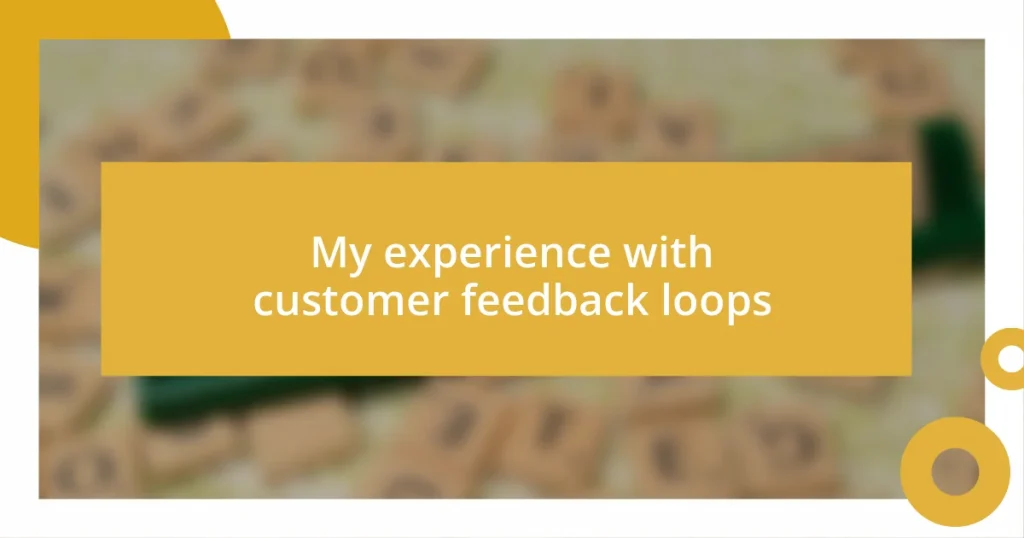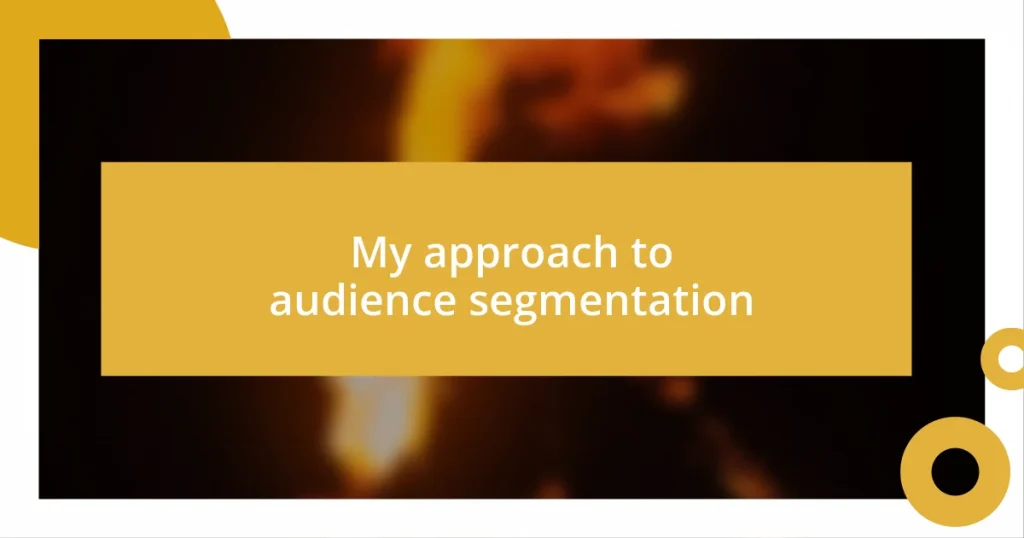Key takeaways:
- Understanding and engaging with company policies fosters a positive workplace culture, promoting accountability, collaboration, and personal growth.
- Clear and well-communicated policies prevent confusion and conflict, empowering employees while enhancing productivity and morale.
- Active participation in policy discussions and feedback loops allows employees to influence changes, creating a sense of community and improving overall workplace dynamics.
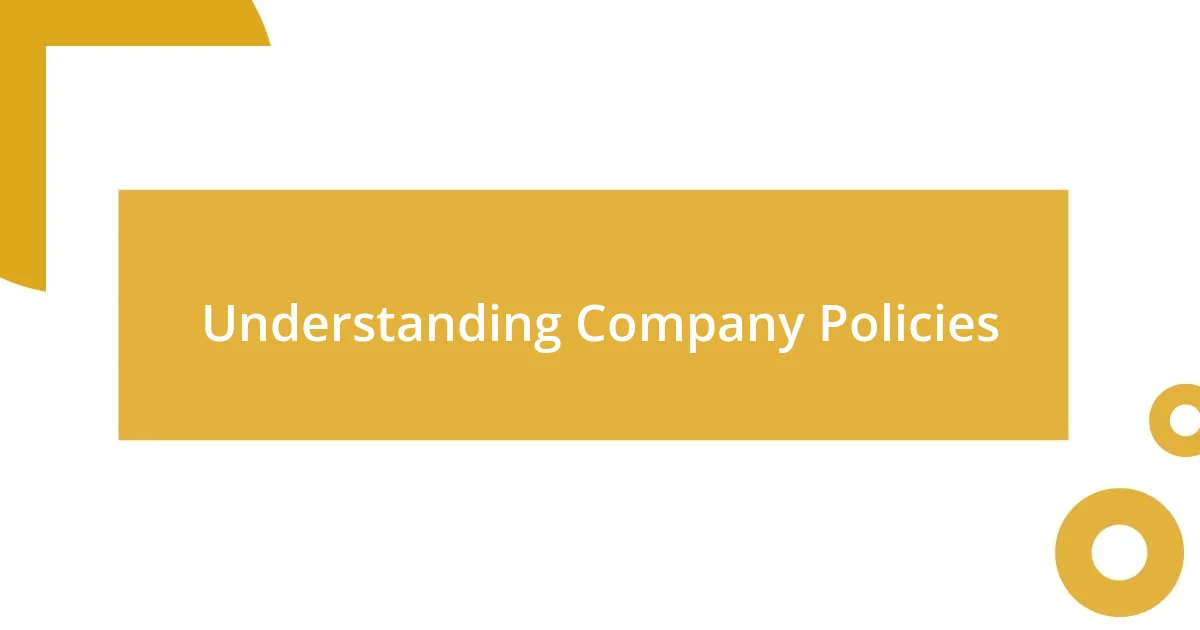
Understanding Company Policies
Understanding company policies can feel overwhelming at times, but I believe they play a crucial role in shaping the workplace environment. Take my first job, for instance—I remember staring at the employee handbook, feeling a mix of confusion and curiosity. Have you ever found yourself wondering how policies really impact your day-to-day work life? It’s essential to grasp that these guidelines are designed not just for compliance, but to foster a sense of security and clarity among employees.
When I first encountered a strict attendance policy, I was hesitant about its potential rigidity. However, as I adapted, I recognized its underlying goal: promoting accountability and fairness. This experience made me rethink how such policies can support a cohesive team dynamic. Could it be that company policies, often viewed as mere restrictions, could actually be the backbone of a positive workplace culture?
There was a point where a colleague and I clashed over a policy regarding remote work. Initially, I saw it as a limitation to my flexibility, but discussing it with my manager helped me appreciate the rationale behind it—ensuring productivity while maintaining team cohesion. It’s this kind of dialogue that transforms an abstract policy into a living part of the workplace, don’t you agree? Embracing the nuances of company policies not only enhances our professional lives but also fosters genuine understanding and collaboration.
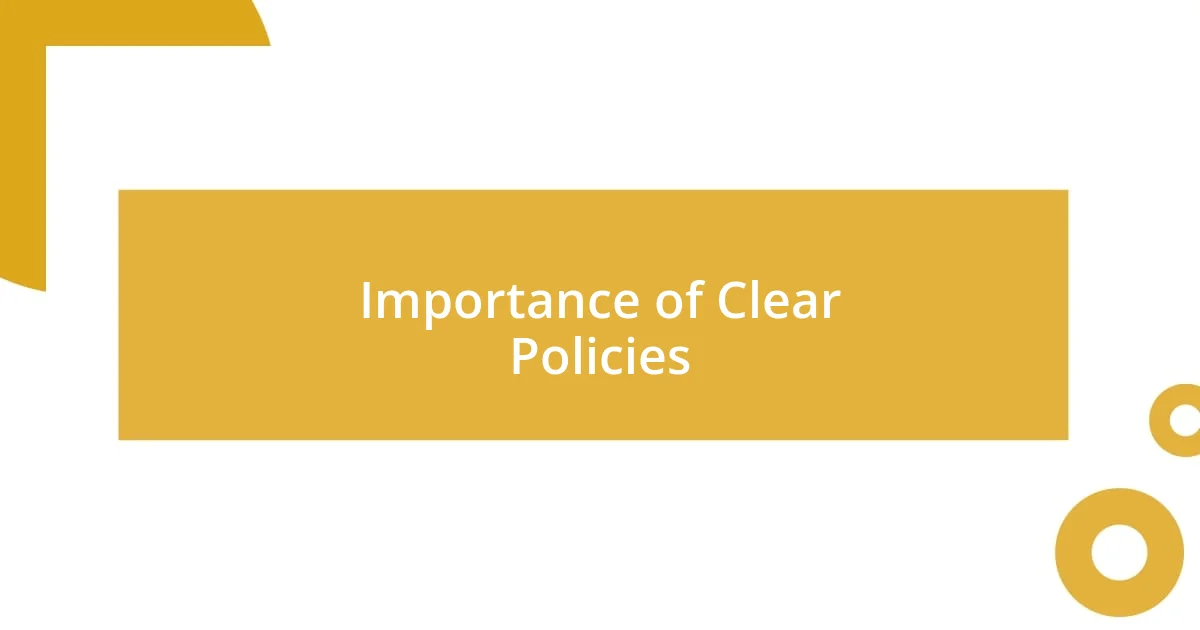
Importance of Clear Policies
Clear company policies are essential for creating a harmonious workplace. In my experience, when policies are well-defined, they alleviate confusion and set everyone on the same page. I once worked in a place where the expectations regarding conduct were vague, and it often led to misunderstandings. I would find myself questioning what was acceptable, which not only created stress but also impacted my productivity. Aren’t you sometimes left uncertain without clear guidelines?
I remember a project where differing interpretations of a policy caused chaos. Some team members felt they had the freedom to manage their time, while others strictly adhered to a more traditional approach. The result was frustration across the board. This taught me that clarity in policies fosters better collaboration and prevents conflict, ensuring that everyone can contribute their best without second-guessing themselves.
On another occasion, our team was introduced to a new performance review policy that caused some initial discomfort. However, once we engaged in an open discussion about its purpose—to promote fairness and growth—many of us felt empowered rather than restricted. This experience showed me that clear policies are not just rules; they’re tools for professional development that can lead to a more engaged team. Have you noticed similar transformations in your workplace?
| Benefits of Clear Policies | Consequences of Ambiguity |
|---|---|
| Enhanced Understanding | Increased Confusion |
| Fosters Team Collaboration | Promotes Conflict |
| Encourages Growth and Development | Stifles Creativity and Initiative |
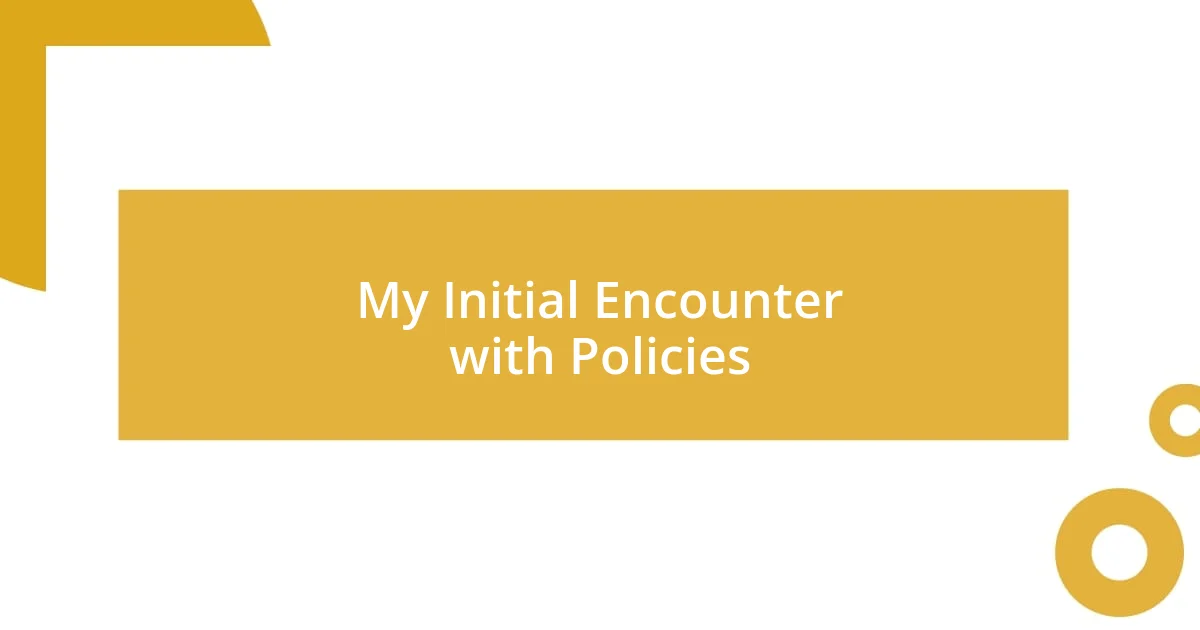
My Initial Encounter with Policies
I recall my first day at a new job and being handed the employee handbook. It felt like a daunting tome filled with rules and regulations, but I soon realized these policies were meant to guide us, not trap us. The insurance benefits section stood out to me, almost as if it were a small lifesaver in a sea of corporate jargon. The promise of coverage gave me a sense of security, even before I’d settled in.
Reflecting on how policies unfolded in my early experiences, I can share a few key highlights that shaped my understanding:
- Surprising Clarity: A once-intimidating dress code policy turned into a personal style challenge, as I learned to express myself within the guidelines.
- Navigating Norms: Witnessing a spontaneous discussion about lunch break policies among colleagues opened my eyes to the social dynamics shaped by those rules.
- First Impressions: The vacation policy felt like a treasure map; plotting courses for personal growth through well-earned time off made me feel valued from the start.
These encounters opened my eyes to the potential for company policies to serve as a foundation for a supportive and transparent work culture.
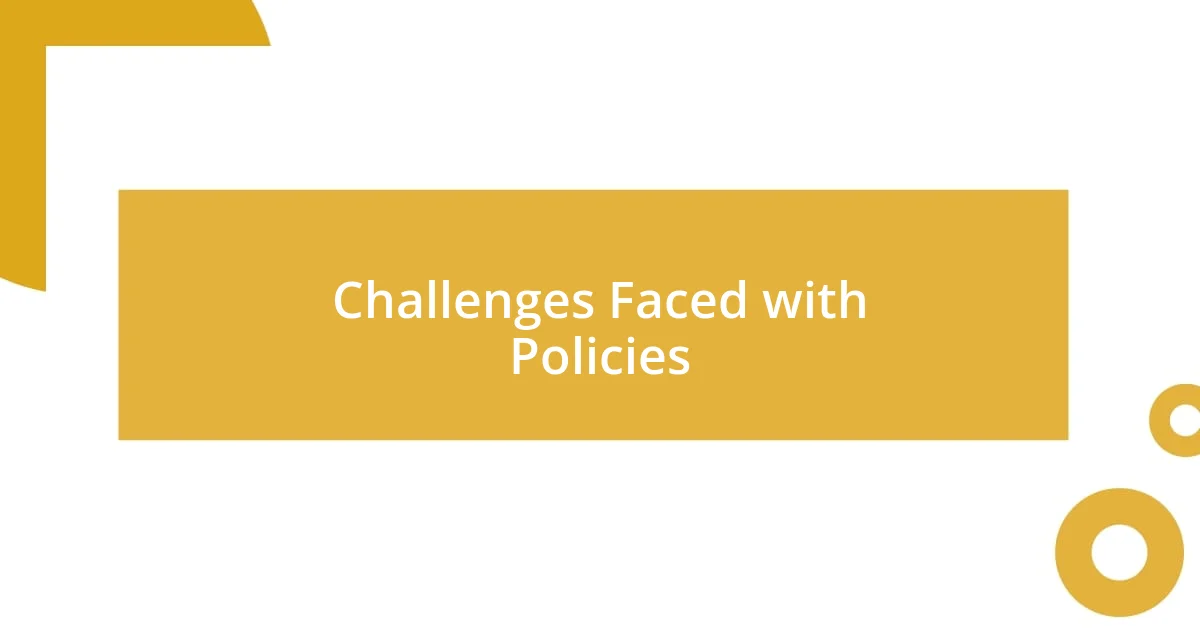
Challenges Faced with Policies
Navigating company policies can sometimes feel like walking through a minefield. I vividly remember a time when I faced a disciplinary policy that wasn’t entirely transparent. My colleague received an unexpected reprimand, yet many of us were left scratching our heads, unsure of where the line truly was. Couldn’t there have been clearer communication? This experience underscored how blurry boundaries can lead to a culture of fear and uncertainty among employees.
Another instance that comes to mind involves a remote work policy my team had to comply with. I truly believed it would enhance our work-life balance, but the strict parameters stifled our flexibility. We often found ourselves juggling home responsibilities with rigid work hours. I started questioning whether the supposed benefits were worth the stress it brought into my daily routine. Does this resonate with you? Sometimes, the intention behind policies can get lost in translation, leaving us feeling constrained rather than liberated.
I also encountered a situation when our wellness policy promoted mental health days, but the actual process for taking those days was convoluted. I remember hesitating to ask for a day off, worrying that I’d be judged for my need to recharge. It made me wonder, why is it so challenging to prioritize mental well-being? The disconnect between the policy’s positive intention and the practical reality left many employees feeling unsupported, illustrating just how vital it is for policies to align with the real experiences of the workforce.
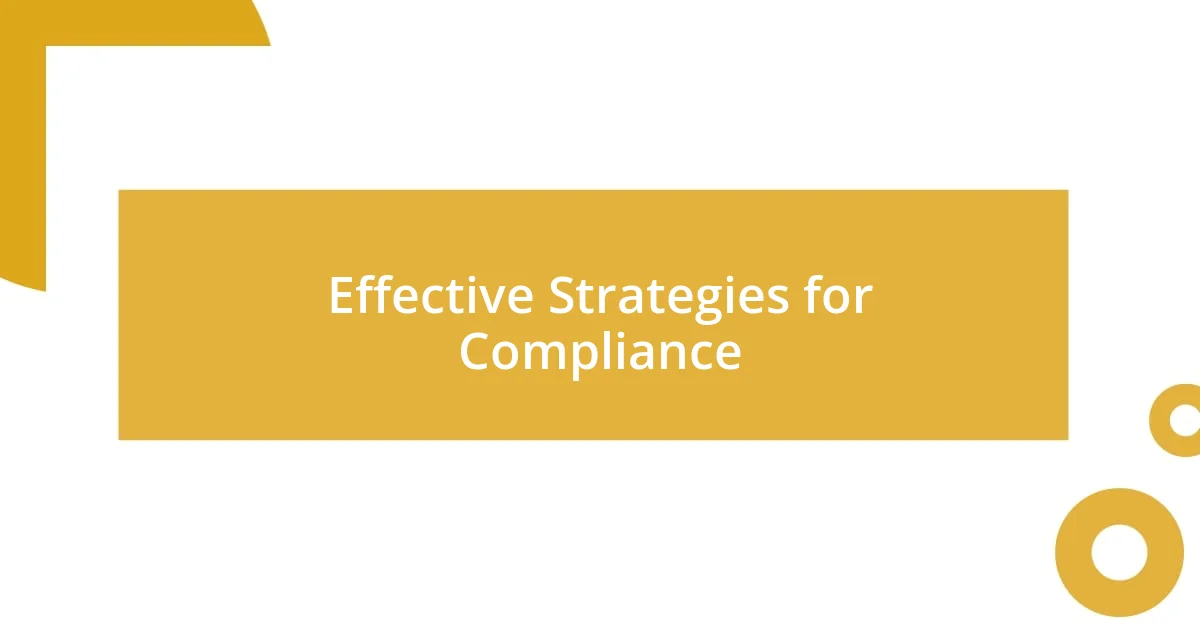
Effective Strategies for Compliance
Effective strategies for compliance rely heavily on clarity and accessibility of policies. I remember when our company introduced an online platform where all policies were housed, complete with search functionality. It truly transformed how we approached compliance because having easy access reduced misunderstandings and empowered us to refer back whenever questions arose. Isn’t it fascinating how technology can bridge gaps in communication?
In another instance, I witnessed firsthand the impact of consistent training sessions. We had quarterly meetings where we explored different policies through interactive scenarios. It not only made the content easier to digest but also fostered an environment where questions felt welcome and encouraged. I can’t help but think how much more engaged and informed I felt after participating in those discussions. Don’t you believe that practical application can make policies feel less daunting?
Lastly, I learned that leadership plays a crucial role in compliance strategies. I once worked under a supervisor who regularly emphasized the importance of understanding and adhering to policies through their actions. When our team witnessed their commitment, it inspired us to follow suit. It made me wonder—how can we expect compliance if our leaders aren’t walking the talk? The ripple effect of leadership engagement can truly nurture a culture of accountability and understanding.
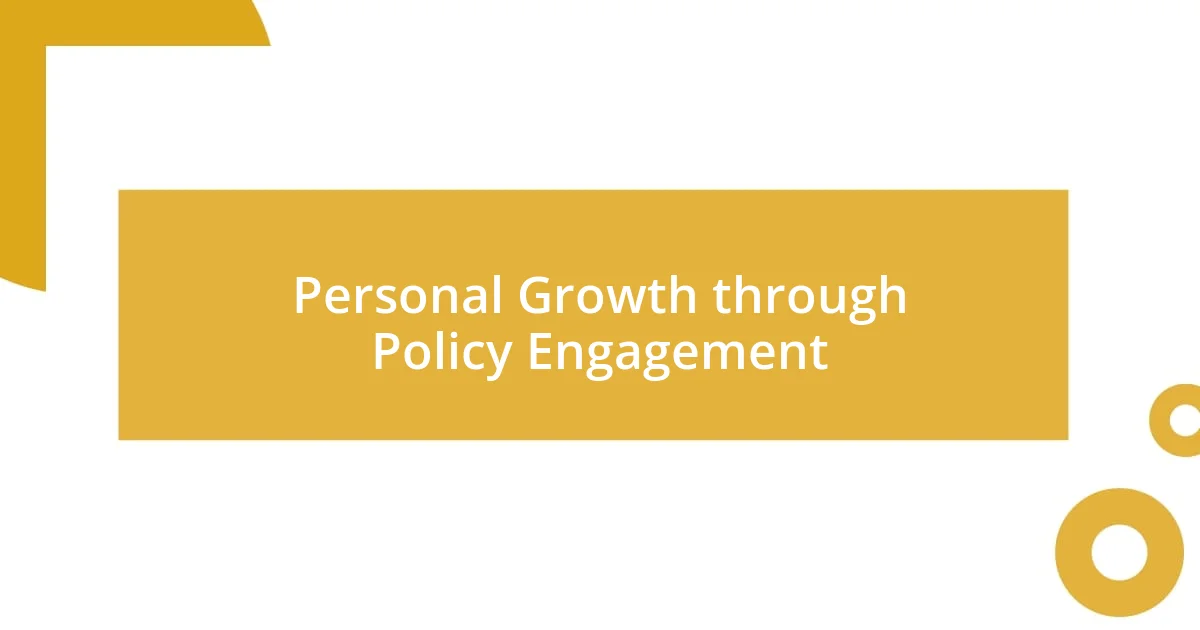
Personal Growth through Policy Engagement
Engaging with company policies has been a significant catalyst for my personal growth. I remember a time when I actively participated in revising our diversity and inclusion policy. The process was eye-opening; listening to my colleagues’ experiences and perspectives deepened my understanding of the unique challenges they faced. It made me realize how our collective narratives could reshape policies to be more inclusive and supportive. Have you ever felt empowered by contributing to something bigger than yourself?
In another instance, I took part in a feedback loop focused on our remote work policy. Initially, I was hesitant, fearing that my opinions wouldn’t matter. However, I soon discovered that sharing my thoughts led to tangible changes—like introducing flexible hours that respected our personal commitments. This taught me that my voice mattered and that engaging with policy isn’t just about compliance; it’s about crafting a workplace that reflects our needs and values. Doesn’t it feel rewarding to know your insights can lead to improvement?
Through these experiences, I discovered that actively participating in policy discussions fostered a sense of community within my workplace. I found myself forging deeper connections with colleagues who shared similar frustrations and aspirations. This emotional investment not only enhanced my professional relationships but also provided a supportive environment for growth. Truly, it’s remarkable how engaging with company policies can transform not just your career but also the workplace culture as a whole. Wouldn’t you agree that fostering such connections can lead to a more productive and harmonious work environment?
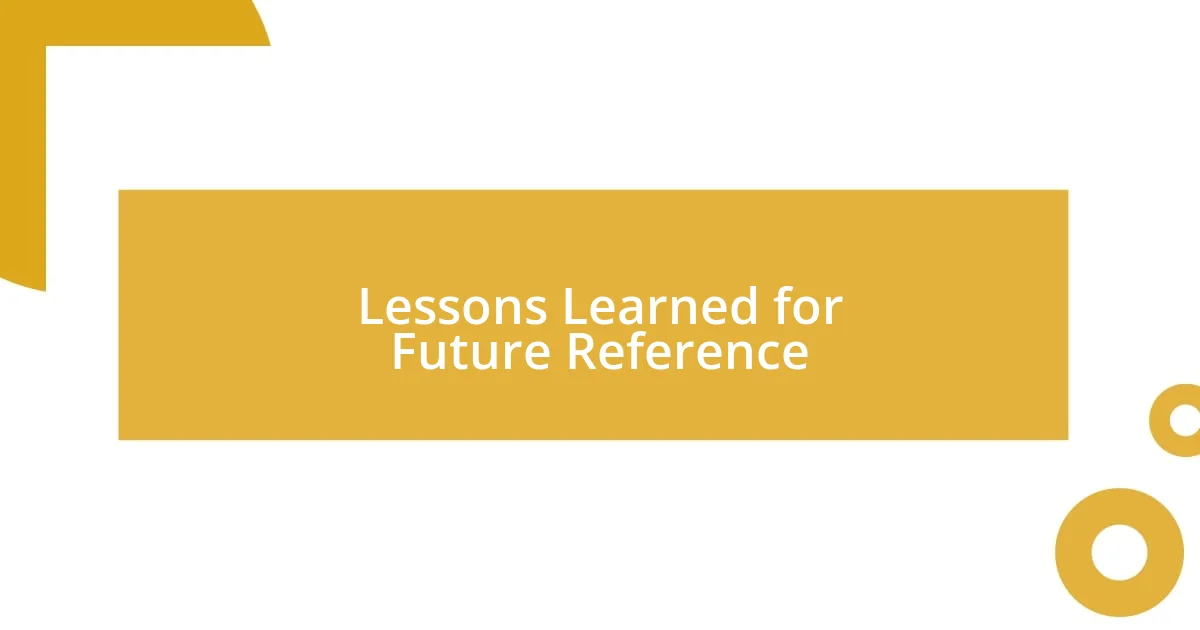
Lessons Learned for Future Reference
Through my experiences, I learned that clear communication is essential in navigating company policies effectively. For example, when we revamped our employee handbook, we organized focus groups where employees could voice their thoughts. It was enlightening to see how a simple discussion could clarify concerns, and I realized that when people feel heard, compliance becomes a collective effort. Have you ever noticed how a shared understanding can lighten the load?
Another key takeaway for me was the importance of flexibility in policy implementation. In my last role, we encountered unforeseen challenges that required us to adapt our health and safety procedures. By welcoming employee input and making real-time adjustments, our team felt more secure and valued. This made me reflect on how sometimes, the best policies are those that evolve with the people they serve.
Lastly, I discovered that continuous feedback loops are vital for long-term success. After implementing new policies, we conducted surveys to understand their impact. The insights we gathered were invaluable, allowing us to refine our approach moving forward. I often think back to how those little changes not only improved compliance but also created an environment where everyone felt they were part of the policy-making process. Isn’t it fascinating how open dialogue can drive sustainable growth?










